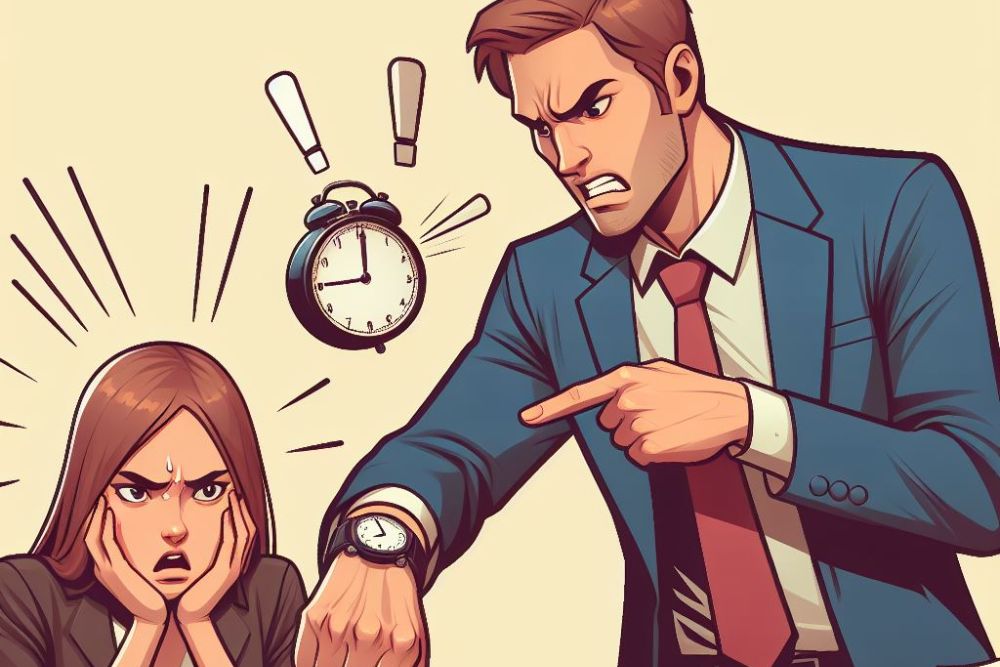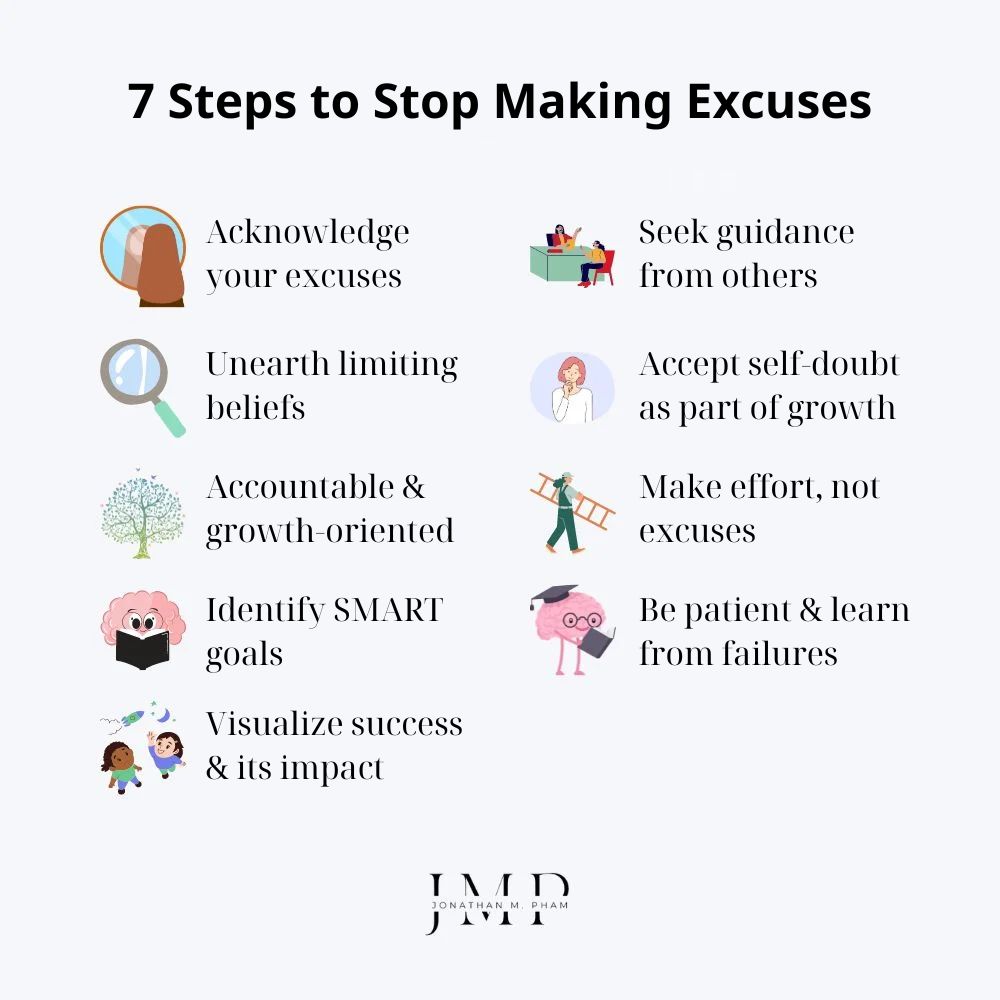Learn how to overcome the detrimental habit of making excuses and embrace accountability for personal professional success.
During each person’s journey towards personal and professional growth, one obstacle that often stands in the way is the habit of making excuses – whether it’s blaming external circumstances, avoiding responsibility, or justifying our shortcomings. By recognizing and addressing this destructive pattern, we may break free from the chains of excuse-making – while paving the way for personal empowerment and fulfillment.
Highlights
- Making excuses is the act of attempting to justify our shortcomings/ avoid responsibility for our actions by giving false reasons instead of genuine explanations. This stems from our desire to protect our image, sidestep conflict, cope with fear, or simply as a way to delay starting a task.
- Among the causes of excuses, it is the tendency to live in the past – and fear the unknown that matters most.
- Despite providing a temporary feeling of relief, excuses ultimately sabotage our growth, achievement, and reputation by preventing us from taking responsibility for our actions. Repetition of this bad habit – especially in the workplace – will make us a jerk in the eyes of others and deny us the chance for long-term success.
- To break free from excuses and achieve change, one needs to acknowledge them, identify their limiting beliefs, embrace responsibility, set goals, visualize success, seek help, and persevere through self-doubt.
- On the other hand, those who wish to address someone’s constant excuses should choose a good time for a direct conversation, demonstrate empathy, offer honest feedback, and support them in finding solutions.
What Does It Mean to Give Excuses?
Making excuses is when we provide false justifications for our inability to perform a task or fulfill an obligation. An example is when you claim to be too occupied to assist your colleague with a project, while the underlying reason is simply a lack of motivation. Or, you may leave a social gathering early citing reasons such as a headache – while in reality, you are actually just feeling bored.
With the exception of instances when people aim to be polite or show respect (which, truthfully, are not as frequent as desired), excuses are primarily employed as a means to evade accountability or prevent personal embarrassment for our doings/ undoings. For instance, if you fail to complete your assigned work, you might resort to justifying yourself with something like:
- “I didn’t have enough time” or
- “I didn’t understand the instructions.”

Characteristics of people who make excuses
Why Do We Make Excuses?
We have more ability than willpower, and it is often an excuse to ourselves that we imagine that things are impossible.
François de la Rochefoucauld
Have you ever pondered over the question: “Why do I keep making excuses?”
This weaseling tendency is deeply rooted in human behavior – and can be attributed to various underlying factors. Below are some of the most common reasons:
- Shifting responsibility: Making excuses allows us to shift the blame for our actions onto external factors or other individuals. By doing so, we safeguard our self-esteem and shield ourselves from feelings of guilt or shame.
- Preserving self-image: Each of us possesses a desired self-image that we strive to uphold. When making excuses, we endeavor to protect that reputation from being tarnished. For instance, those who value being perceived as diligent might be tempted to come up with a rationale for not completing a project – so as to avoid appearing lazy.
- Conflict avoidance: Excuses are sometimes employed as a means of sidestepping conflicts with others. Instead of expressing our true sentiments, we might resort to explanations such as illnesses to decline an invitation to a social gathering.
- Coping with fear and anxiety: Excuses can serve as coping mechanisms for dealing with fear or anxiety, particularly in situations where failure or success is at stake. For example, if we fear failing a test, we may resort to excuses like “I didn’t have enough time to study” as a defense technique, rather than facing the challenge head-on.
- Procrastination: Making excuses is also a sign of procrastinating tendencies. For instance, if we have a week to complete a paper, we might utilize excuses like being “too busy” as a means to delay initiating the task.
By recognizing these underlying motivations, we can gain a deeper understanding of the complex dynamics that drive our behavior in various aspects of life.

The mindset of people who make excuses
Clinging to the Past – An Often Overlooked Cause of Excuses
When it’s hysterical, it’s historical.
Marshall Goldsmith
Making excuses and clinging to the past share a common thread – they are both mechanisms that shield us from reality and hinder our ability to embrace change. When we make excuses, we strive to rationalize our actions or feelings by assigning blame to external factors/ circumstances.
Similarly, clinging to the past involves resistance to the present or future, as we desperately hold onto memories or emotions. These behaviors, although distinct, can impede our growth, learning, and progression.
Let us explore some of the underlying reasons behind both excuses and our attachment to the past:
- Fear of consequences: One reason for making excuses and clinging to the past is the fear of confronting the repercussions of our choices, the uncertainty that the future holds, or the pain associated with loss.
- Shame and avoidance: Another factor is the deep-seated shame we may feel when acknowledging our mistakes, failures, or vulnerabilities, leading us to resort to excuses or hold onto past events as a shield against self-blame. This is actually a byproduct of the desire to win at all costs – under all circumstances.
- Identity and belief preservation: Our attachment to the past can stem from a desire to cling to the identity, beliefs, or habits that have been shaped by our past experiences. This affection is what hinders our ability to adapt and grow beyond what we once knew.
- Comfort in familiarity: Despite the dissatisfaction or lack of fulfillment it may bring, the familiarity and predictability of the past offer a sense of comfort that is hard to resist. Consequently, we may be hesitant to let go and explore uncharted territories.

Reasons to make excuses
Why You Should Stop Making Excuses
He that is good for making excuses is seldom good for anything else.
Benjamin Franklin
Psychologists categorize excuse-making as a form of “self-handicapping,” which ultimately sabotages our performance and motivation. This bad habit diverts the attention away from our own flaws or mistakes – while at the same time attributing them to external factors.
Though some may perceive excuses as beneficial – allowing them to preserve their own self-esteem and alleviate stress – such justifications will prove detrimental if they hinder our ability to take responsibility, achieve our goals, or learn from our failures. As time passes by, the effects get accumulated, until there is no going back.
Dangers of making excuses for our bad behaviors:
- Impede personal growth and learning: Excuses prevent us from acknowledging our mistakes – they take away the opportunity for growth and self-improvement that comes from taking responsibility and learning from our missteps. Not to mention, they also impair our judgment and decision-making skills, stifling creativity and hindering proactive measures.
- Impose self-imposed limitations: By making excuses, we unknowingly reinforce self-limiting beliefs that undermine our true potential and erode confidence in our abilities. Such mentalities prompt us to surrender before even embarking on the journey, resulting in disappointment and frustration.
- Reduce self-control: Excuses relinquish our control over life’s outcomes, surrendering to external forces that dictate our actions. This lack of agency fosters a sense of helplessness and diminishes self-esteem.
- Damage personal reputation & professional development: Excuses impact not only how we view ourselves – but also how others perceive us as a person. Making excuses that lack credibility, value, or empathy erodes trust, respect, and confidence – it implies a disregard for others’ time and trust, straining relationships and impeding future connections. Consistent excuse-makers often face negative perceptions, being seen as lazy, unreliable, and untrustworthy – which may impede their career advancement and hinder personal growth.
- Give rise to negativity: Over time, making excuses will eventually result in missed opportunities that could have brought transformative change. This surrender breeds dissatisfaction, regret, and pessimism, casting a shadow of negativity on life and self.
The trouble with excuses is that they become inevitably difficult to believe after they’ve been used a couple of times.
Scott Spencer

People who make excuses never make progress
The Problem of Making Excuses in the Workplace
(This part – along with the 2 sections below – is compiled with inspiration from the bestseller ‘What got you here won’t get you there‘ by World #1 Executive coach, Dr. Marshall Goldsmith)
Making excuses is a bad habit commonly observed in the workplace, manifesting in two distinct categories: blunt and subtle excuses.
Blunt
Blunt excuses resemble the classic “dog ate my homework” scenario. For instance, one might say, “Apologies for missing our lunch date. My assistant mistakenly marked the wrong day in my calendar.”
Essentially, such an excuse aims to shift blame away from oneself – by attributing it to someone else’s incompetence.
However, this approach rarely goes unnoticed; not to mention, it fails as an effective leadership strategy. Nobody would ever praise the leader for their exceptional excuse-making skills – nor their ability to turn things around with justifications.
Subtle
The more subtle excuses emerge when we ascribe our shortcomings to fixed genetic traits that we believe cannot be altered. Such rationalizations revolve around ingrained attributes that we perceive as inherent flaws, creating a self-perception that hinders personal growth.
Undoubtedly, you have encountered these self-limiting excuses, perhaps even using them to describe yourself:
- “I’m innately impatient.”
- “I always procrastinate until the last minute.”
- “I’ve always had a quick temper.”
- “My time management skills are abysmal. Both my colleagues and spouse have repeatedly pointed out my tendency to waste time on frivolous projects and discussions. I suppose that’s just who I am.”
It is astonishing how frequently we encounter intelligent and accomplished individuals making purposefully self-deprecating remarks about themselves. It becomes a subtle art, as they unwittingly categorize themselves based on stereotypes – whether it’s impatience, a short fuse, or disorganization. They then employ these stereotypes to justify otherwise inexcusable behaviors.
The truth is that perpetuating these excuses does a disservice to personal and professional development. It limits our potential for growth – as well as hampers our ability to overcome challenges. By embracing a mindset that acknowledges our capacity for change and improvement, we can break free from the constraints of these excuses and strive for excellence.
Ninety-nine percent of the failures come from people who have the habit of making excuses.
George Washington Carver

The bad habit of making excuses
Stop Making Excuses and Own Your Actions
People with integrity do what they say they are going to do. Others have excuses.
Laura Schlessinger
In 2004, when Bill Clinton released his immensely popular memoir, he knew he had to address the infamous Monica Lewinsky scandal that marred his second term. Rather than resorting to excuses, he took personal responsibility and acknowledged it as a personal failure, an internal struggle he had succumbed to. In his memoir, he emphasized that regardless of any external influences or circumstances, once people reach the age of accountability, they must take ownership of their mistakes.
Clinton’s recognition of the distinction between explanation and excuse was not solely because his conduct was inexcusable. The truth is, there is simply no valid reason for making excuses.
When you catch yourself saying, “I apologize for being late, but the traffic was unbearable,” pause after the word “apologize” immediately. Blaming traffic is a feeble excuse that fails to justify keeping others waiting. The more prudent course of action would have been to start earlier.
What is the worst outcome? Arriving ahead of schedule and having to spend a few extra minutes in the lobby? Are you genuinely concerned about saying, “I’m sorry for being early, but I left too soon, and the traffic was not as terrible as anticipated”?
If the world operated on such principles, excuses would hold no sway.
Read more: Refusing to Apologize – How to Abandon This Insidious Habit

People who make excuses
It All Starts with Changing How You Think
As mentioned, personal stereotyping is a deep-rooted cause of our tendency to make excuses. Such stereotypes often trace their origins to long-standing narratives, frequently stemming from childhood. These stories, regardless of their factual basis, embed themselves in our minds and established a foundation of low expectations that inevitably become self-fulfilling prophecies. We unwittingly behave in ways that align with our negative beliefs, as if driven to prove them right.
Dr. Marshall Goldsmith once shared his own story about this phenomenon. From his earliest years, his mother would tell him that he was the smartest boy in Valley Station – and that he did not possess mechanical skills, probably because she was determined to ensure he didn’t end up pumping gas or changing tires at the service station.
Marshall, you are extremely smart. In fact, you are the smartest little boy in Valley Station!
or
Marshall, you have no mechanical skills, and you will never have any mechanical skills for the rest of your life.
The impact of this imprinting was profound. Goldsmith was never encouraged to engage with cars or tools, and as a teenager in the 1960s, he confesses that he believed a “universal joint” was a term connected to hippies’ smoking habits. Not only did his parents assume his lack of mechanical aptitude, but even his friends were aware of it.
At the age of 18, he took the U.S. Army’s Mechanical Aptitude Test and scored in the bottom second percentile nationwide – which further confirmed his self-limiting belief.
6 years later, however, while pursuing his Ph.D. at UCLA, Dr. Goldsmith found himself confronted with a defining moment. One of his professors prompted him to list his strengths and weaknesses.
On the positive side, he confidently listed “research,” “writing,” “analysis,” and “speaking”. Yet, on the negative side, he wrote, “I lack mechanical skills, and I always will.”
The professor then engaged in a conversation with him. Here’s how it went out:
“How are your mathematical skills?” he asked.
Goldsmith proudly replied that he had scored a perfect 800 on the SAT Math 1 achievement test.
The professor then asked, “Why is it that you can solve complex mathematical problems, but you can’t solve simple mechanical problems?”
Then he asked, “How is your eye-hand coordination?”
Goldsmith said that he was good at pinball and had helped pay his college expenses by shooting pool, so he guessed that it was fine.
The professor asked, “Why is it that you can shoot pool but you can’t hammer nails?”
It was at that moment that Dr. Goldsmith recognized that he was simply living out the expectations he had chosen to believe. That he was the one repeatedly affirming, “You can’t do this!”
The truth was that as long as he continued to feed that self-doubt, it would persist.
Mr. Goldsmith’s story is a testimonial to the dangerous effects of making excuses. The next time you find yourself uttering, “I’m just no good at…” pause and ask, “Why not?”
We often weasel away from confronting our chronic lateness because it has been a recurring theme throughout our lives, and those around us have allowed us to get away with it. The same holds true for other bothersome habits we may possess, such as passing judgment, making destructive feedback, or refusing to share information.
It is crucial to recognize that these are not inherent genetic flaws. We were not born with these traits, regardless of what we have been conditioned to believe.
Likewise, when you witness a coworker attempting to evade responsibility by saying, “I’m just no good at…,” challenge them with a simple question: “Why not?”
If we can break free from the cycle of self-excusing, we open ourselves up to tremendous growth and improvement in nearly every aspect of our lives. By embracing personal responsibility and dismissing the limitations we have imposed upon ourselves, we can achieve remarkable progress.
The only thing standing between you and your dream is the will to try and the belief that it is actually possible.
Joel Brown
Read more: Self-questioning – Why Should We Practice It on a Daily Basis?
How to Stop Making Excuses & Start Making Changes
If you really want to do it, you do it. There are no excuses.
Bruce Nauman
Transforming your mindset and embracing personal responsibility are essential steps to stop making excuses and start taking meaningful action. Here are some practical strategies you can employ to facilitate such a change – and take charge of your life:

Recognize & acknowledge your excuses
The initial step in overcoming any detrimental habit is to identify it. Take the time to compile a list of the excuses you frequently make and reflect on the underlying reasons behind them.
Once you have identified common scenarios when you tend to weasel away from responsibilities, it’s time to scrutinize the validity of your actions. Question whether these excuses hold true or if they are merely self-imposed barriers. Assess whether they are serving any constructive purpose in your life.
Unearth your limiting beliefs
The next thing to do is to dig deeper to uncover the limiting beliefs that are hindering your progress towards your goals. Challenge these beliefs and replace them with empowering thoughts that bolster your personal growth and pave the way for success.
Adopt an accountable & growth-oriented mindset
Our mindset plays a crucial role in shaping our actions. In order to start abandoning the habit of making excuses, you need to first believe in your capabilities and adopt a positive outlook. View obstacles as opportunities for growth and focus on solutions rather than dwelling on limitations. Shift your perspective from what you can’t do to what you can do and how you can overcome challenges.
Take ownership of your life and the choices you make. Refrain from placing blame on others or external circumstances for your failures or shortcomings. Instead, acknowledge your mistakes, learn from them, and use them as stepping stones toward improvement.
Set SMART goals
Establish specific, measurable, achievable, relevant, and time-bound goals. Clear and realistic objectives provide you with direction and motivation to stay on track.
Whenever faced with the temptation to make excuses, remind yourself of your goals and the reasons why you aspire to achieve them. Keep your objectives at the forefront of your mind, serving as a constant source of motivation.
Consider breaking down your goals into smaller, actionable tasks. This approach ensures that you do not feel discouraged by the complexity or difficulty of your objectives. Additionally, it also allows for progress tracking and celebrating achievements along the way.
Visualize success and its emotional impact
Envision yourself successfully accomplishing your goals and immerse yourself in the positive emotions associated with that achievement. Visualizing your success boosts confidence and ignites the motivation needed to take action.
Seek guidance
Identify those (ideally in your network) who have achieved what you aspire to accomplish or have overcome similar challenges. Learn from their experiences and strategies, applying them to your own situation. If possible, seek their advice or support.
Having a coach/ mentor or an accountability partner is extremely conducive to speeding up your professional journey – as they will help provide the necessary support and hold you accountable for your own actions.
Accept self-doubt as a catalyst for growth
Self-doubt is a natural part of the growth process. Rather than allowing it to paralyze you, embrace it as motivation to improve and prove your own reservations wrong.
Make effort, not excuses
Action is the antidote to excuses. Avoid mere talk and initiate meaningful steps toward your goals. Progress is only possible through consistent action.
Along the way, make sure to acknowledge and reward yourself when possible. Celebrating your successes reinforces your motivation and helps maintain your focus.
Exercise patience and learn from failures
You have to understand that breaking the habit of making excuses takes time and effort. Do not fear failure; it is an inevitable part of growth. Learn from your mistakes, adjust your approach, and keep moving forward.
Remember, perseverance is key. Do not be disheartened if you stumble on your path. With determination and continued effort, you will ultimately succeed in overcoming excuses and achieving your goals.

How to Tell Someone to Stop Making Excuses
On the other side, when faced with a colleague or friend who consistently resorts to making excuses, it’s important that you approach the situation with care and effectiveness. Here are some valuable tips for navigating these conversations:
- Choose the opportune moment and location: Select a time when both of you may engage in a relaxed and uninterrupted discussion. Avoid approaching the person when he/she is stressed or preoccupied.
- Be direct yet compassionate: Express your genuine concern about their habit of making excuses – including how it is impacting them and those around them. Refrain from using accusatory phrases like “you always make excuses” or “you never take responsibility for your actions.” Instead, focus on specific behaviors that are causing concern.
- Show empathy: Seek to understand the underlying reasons behind their excuses and their underlying fears. Validate their emotions and demonstrate your genuine care for their well-being. For example, you may acknowledge their stress about a project but also highlight their capabilities by saying, “I understand you’re feeling overwhelmed by this project, and I truly believe you have the skills to excel.”
- Be honest: Avoid sugarcoating at all costs – instead, provide an honest assessment of how their excuses are affecting their goals, performance, or reputation. For instance, you can address a missed deadline by saying, “I understand you had a lot of things on the plate, but we had ample time to complete the report beforehand. Your excuses are letting the team down.”
- Offer support: Extend a helping hand or advice if they require it, but avoid doing the work for them. Encourage the person to seek solutions or alternatives rather than focusing solely on the obstacles they face. For example, you may suggest they take a tutorial or watch online videos to overcome software difficulties: “If you’re having trouble with the software, why not explore tutorials or online resources? Putting in the effort can help you learn it quickly.”
- Maintain positivity: Recognize their strengths and past accomplishments, motivating them to excel. Convey your belief in their potential and express your desire for their success. Emphasize their capabilities by saying something like, “You possess remarkable talent and creativity, and I’ve witnessed your remarkable achievements. I know you have the ability to overcome this challenge, and I’m here to support you every step of the way.”

Additional Resources to Help You Abandon the Habit of Making Excuses
Quotes
It is better to offer no excuse than a bad one.
George Washington
Never make excuses. Your friends don’t need them and your foes won’t believe them.
John Wooden
We have forty million reasons for failure, but not a single excuse.
Rudyard Kipling
A man can fail many times, but he isn’t a failure until he begins to blame somebody else.
John Burroughs
Difficulty is the excuse history never accepts.
Edward R. Murrow
It is wise to direct your anger towards problems – not people, to focus your energies on answers – not excuses.
William Arthur Ward
Hold yourself responsible for a higher standard than anyone else expects of you. Never excuse yourself.
Henry Ward Beecher
It is wrong and immoral to seek to escape the consequences of one’s acts.
Mahatma Gandhi
The difference between a successful person and others is not a lack of strength, not a lack of knowledge, but rather a lack of will.
Vince Lombardi
Don’t excuse yourself by saying, ‘Look, we didn’t know.’
Proverbs 24:12
Books
These books offer different perspectives on the topic of making excuses and how to overcome this habit. They provide practical advice and strategies that you can leverage to start living an owned and fulfilling life.
- No Excuses: The Power of Self-Discipline by Brian Tracy
- The Slight Edge: Turning Simple Disciplines into Massive Success by Jeff Olson
- Stop Making Excuses by Valerie Devone
- Stop the Excuses: How to Change Lifelong Thoughts by Wayne Dyer

Final Thoughts
Making excuses is a common but detrimental habit that limits our progress and hinders our ability to achieve our goals. By cultivating self-awareness, challenging our assumptions, and taking proactive steps toward change, we can break free from this destructive cycle.
True success is achieved only when we dare to take responsibility for our actions, confront challenges head-on, and refuse to let excuses define our journey. The choice is ours to make.
You may be interested in:
- Taking Credit for Others’ Work: A Detrimental Habit
- Playing Favorites: The Dark Side of Leadership
- Not Saying Thank You: Why Do We Often Fail to Express Gratitude?
- Not Listening: The Silent Killer of Relationships and Success in Life
- Self-leadership: The Art of Leading from Within
Let’s Tread the Path Together, Shall We?


